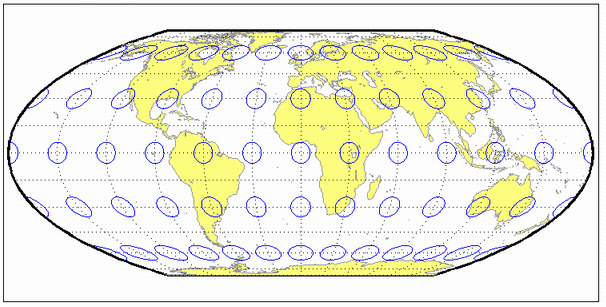flatplrq
McBryde-Thomas Flat-Polar Quartic Projection
Classification
Pseudocylindrical
Identifier
flatplrq
Graticule
Central Meridian: Straight line 0.45 as long as the Equator.
Other Meridians: Equally spaced quartic (fourth-order equation) curves concave toward the central meridian.
Parallels: Unequally spaced straight parallel lines, perpendicular to the central meridian. Spacing is greatest near the Equator.
Poles: Lines one-third as long as the Equator.
Symmetry: About the central meridian or the Equator.
Features
This is an equal-area projection. Scale is true along the 33º45' parallels and is constant along any parallel and between any pair of parallels equidistant from the Equator. Distortion is severe near the outer meridians at high latitudes, but less so than on the pointed-polar projections. It is free of distortion only at the two points where the central meridian intersects the 33º45' parallels. This projection is not conformal or equidistant.
Parallels
For this projection, only one standard parallel is specified. The other standard parallel is the same latitude with the opposite sign. The standard parallel is by definition fixed at 33º45'.
Remarks
This projection was presented by F. Webster McBryde and Paul D. Thomas in 1949, and is also known simply as the Flat-Polar Quartic projection.
Example
landareas = shaperead('landareas.shp','UseGeoCoords',true);
axesm ('flatplrq', 'Frame', 'on', 'Grid', 'on');
geoshow(landareas,'FaceColor',[1 1 .5],'EdgeColor',[.6 .6 .6]);
tissot;
Version History
Introduced before R2006a